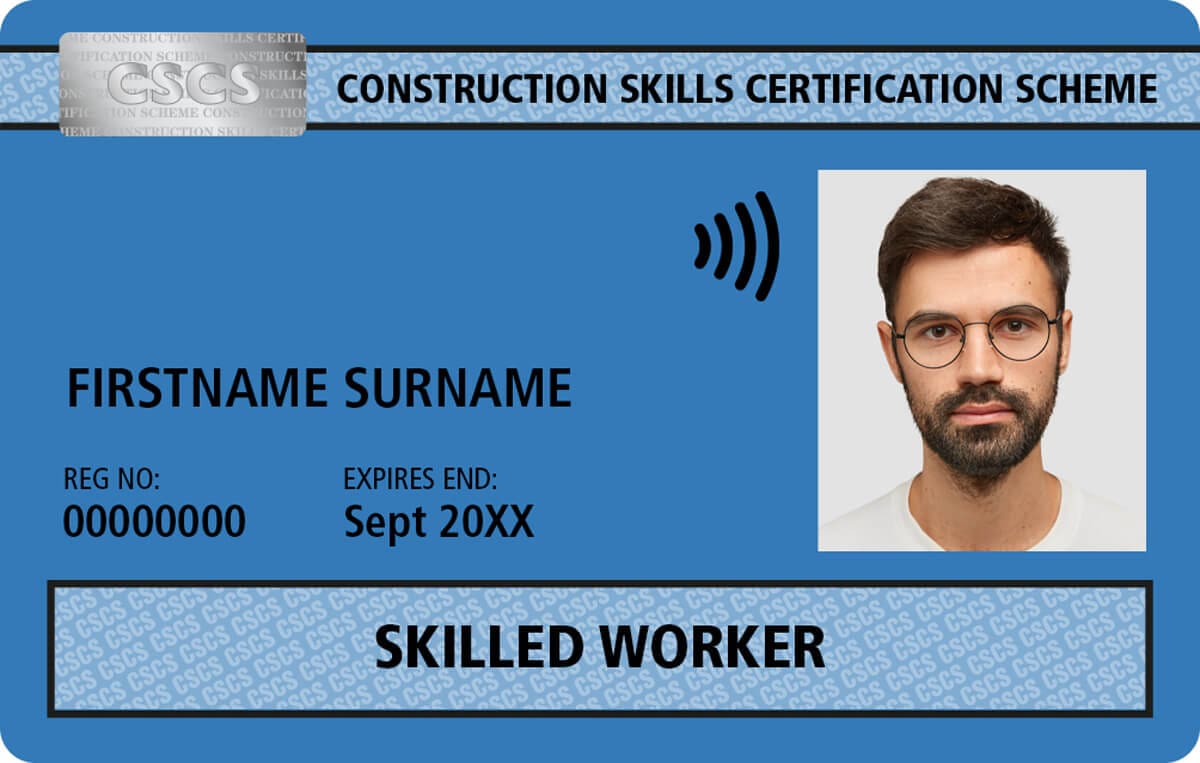
CSCS Cards – The Colours, The Costs and What You Need To Do To Get Your CSCS Card Sorted Out
What does CSCS stand for and why do I need a card?
CSCS stands for “Construction Skills Certification Scheme”, originally created in 1995 by the Construction Leadership Council.
The scheme has since been widely adopted across the Construction Sector

The CSCS Card Scheme provides an easy means of ensuring all people working on building sites have a basic understanding of Health & Safety issues and a recognisable level of competence for the trade they are working in.
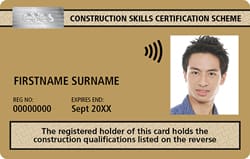
The card contains personal details of the holder and a photograph. In addition, the holder’s CSCS Registration Number and designation of the card is on the front – with the trade for which the holder is qualified shown on the rear.
The construction sector found the scheme beneficial in that production of a card would signify the worker concerned was competent and aware of general health and safety issues relevant to building sites.
Many employers started to adopt an “all carded” approach so they could be reassured as to the basic knowledge their staff could be expected to have.
Over the years, the CSCS has developed, partly to deliver enhanced benefits to employers and site agents – such as the addition of a “smart” chip so cards may be easily verified – and to drive the construction sector’s migration to a fully qualified workforce.
There are now many ‘Partner’ schemes to the original one, which takes into account the breadth of occupations in the construction sector. An example is the Asbestos Removal Management Institute scheme, for people who undertake the removal of asbestos from buildings.
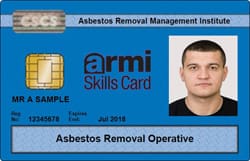
Partner schemes have the CSCS hologram logo on them and a smart card chip as well, for easy identification. Download a list of CSCS Partner Schemes here.
In 2012, the basic Health & Safety test was enhanced to include environment issues and it is now called the “Health, Safety & Environment” test.
This was in response to the development of the “Considerate Construction” scheme and has broad reaching effects, preventing disturbance to wildlife, unnecessary noise and the risk of pollution of waterways and drains from work taking place nearby.
However, whilst the original scheme was also intended to signify the trade competencies of the holder, the vast majority of cards issued were either Green “Site Operative” or White “Construction Related Occupations” cards – which obviously did not reflect any specific trade skills.
Much of this was due to resistance on the part of the workforce, many of whom objected to having to “be tested for the job they’d been doing for years”.
Additionally, Site Agents under pressure to get work completed were often tempted to turn a blind eye to workers whom they knew could get the work required done.
Clearly, further rigour needed to be applied to the scheme. The first step taken in 2014 was to withdraw and replace the Green “Site Operative” card, which was re-designated “Site Labourer” and which required the holder to undertake a Level 1 Health & Safety in a Construction Environment qualification.
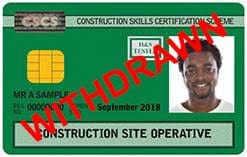
Unsurprisingly, this caused people to seek out a card they could get easily and without the expense of qualifications and there was a rush in applications for “Construction Related Occupations” cards, originally intended for people who were responsible for cleaning finished properties or similar non-trade tasks associated with building.
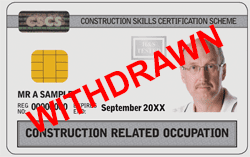
The CSCS and employers reacted swiftly – the “Construction Related Occupations” card was withdrawn in 2017.
At the same time, the “Visitor” card was also designated for withdrawal and went out of use in August 2020.
What has been less noticed, but very welcome, has been the reduction in both injuries and in particular deaths on construction sites. One death is too many, but in the latter 2000’s hundreds of people were being killed or injured on construction sites every year.
It is fair to say that since the COVID-19 pandemic, the number of employers/sites requiring the “right” card for a particular trade has increased substantially.
It’s fair to say the CSCS Card Scheme is now fully embedded and understood within the Construction Sector
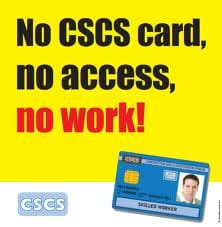
It is also the case that the United Kingdom is an outlier amongst similar countries in permitting unqualified people to undertake construction work. Australia, New Zealand, Canada and the United States require licensing of contractors.
There’s no doubt when the Public Inquiry into the Grenfell Tower disaster of 2017 publishes the report about that tragedies’ circumstances, further pressure will come for the competence of construction workers to be evidenced by qualifications.
Can I get a CSCS Card without an NVQ?
The position now is that more and more sites are “fully carded” and you need a CSCS Card to work on them. The CSCS is working with the industry to avoid people being refused entry to sites when they don’t need to perform a construction related task.
However, you won’t be able to undertake “trade” work without the appropriate card – usually a Blue “Skilled Worker” card.
The Construction Leadership Council (CLC) recommends “Cards will be required by those working predominantly on construction sites undertaking a recognised construction occupation.“
To get the Blue CSCS Card, you will need a “nationally recognised construction related occupation” for that trade at Level 2.
Sometimes this is misinterpreted to mean the National Vocational Qualification, but that’s not the case – many other qualifications may be recognised, and it is always worth checking with CSCS before spending more money.
You may not need to have a CSCS Card at all – it is fair to say the scheme has been misinterpreted by some people in the construction sector and clarification was issued recently with a list of occupations for which no CSCS card is required being published. You can see that list here.
The CLC also says “Cards will not be issued in respect of non-construction related occupations.”
You do not need a card if you are on a short term (30 days maximum) work placement.
The CSCS website has a ‘Card Finder’ facility and you should use that to find out if you need a card – and which qualification and Health & Safety test you need.
How do I get a CSCS Card?
If you have taken the appropriate CITB Health, Safety & Environment test (often called the CSCS Skills Test or CSCS Touch Screen Test) within the past two years and you have the relevant qualification, all you need to do is go online to the CSCS website and make your application.
It’s important you do that directly through the CSCS website, because there are many ‘lookalike’ websites where you will pay (sometimes quite substantial) ‘administration fees’.
Here’s an example of a Google result for ‘CSCS Card Application’ The top two sites charge £65.00
The CSCS Card should cost £36.00. It is only available from https://www.cscs.uk.com/applying-for-cards/ If you are being asked for more, you are on the wrong website!
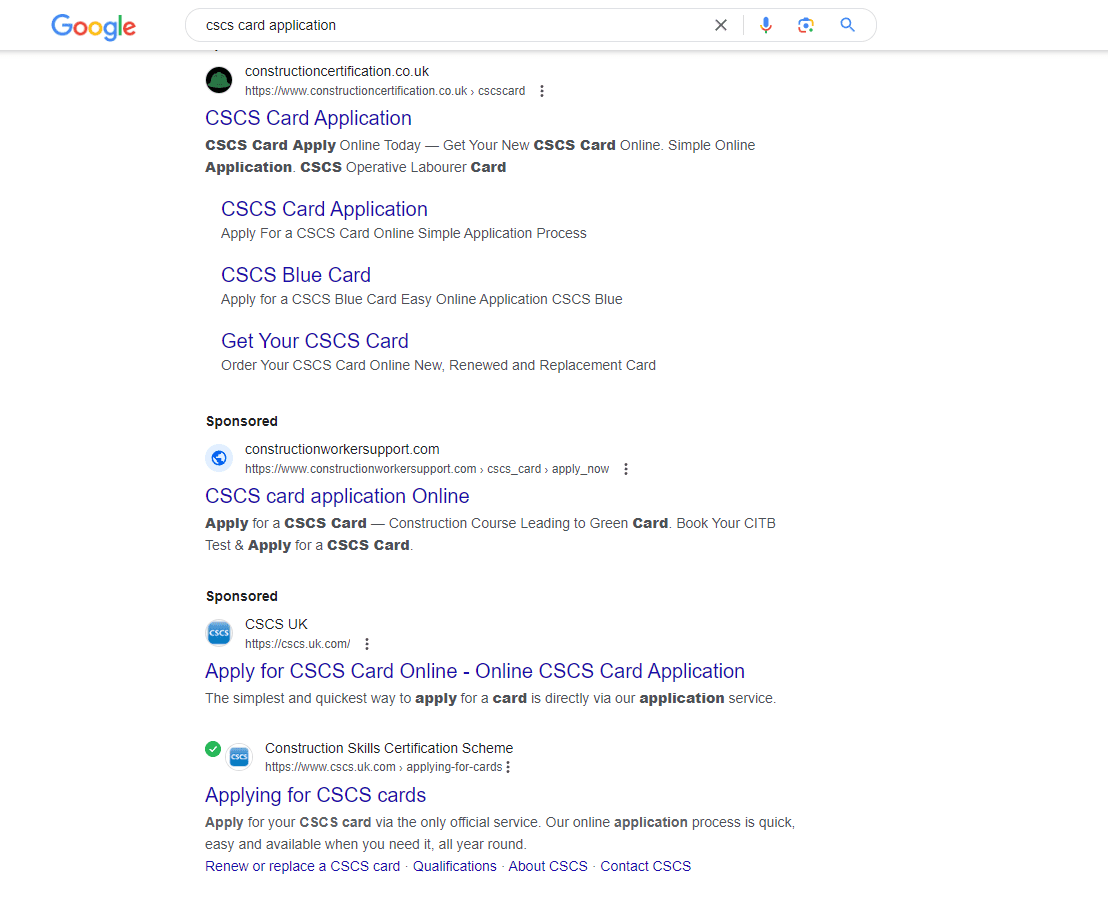
Where do I take the CITB Health Safety & Environment Test?
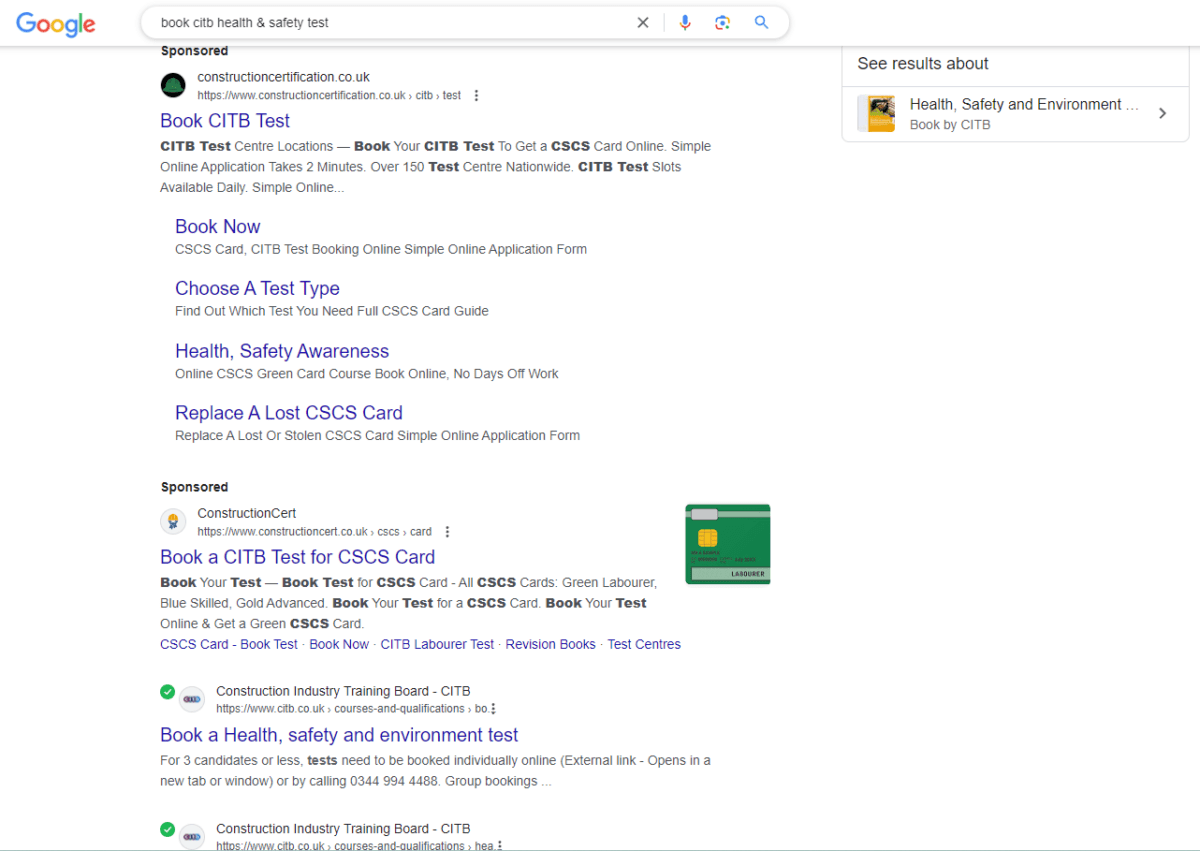
Whatever you do – don’t just “Google” it! The same dangers apply as for CSCS Cards.
These sites charge over £40 for the CITB Site Operatives’ Health & Safety Test.
Don’t pay a ‘booking fee’. You can book your CITB Health, Safety & Environment Test online for £22.50.
There are test centres all over the country. You must take in-date photo identification with you.
If you have passed the CITB Test in the last two years – you can get a new card without taking it again.
Which CSCS Card do I need?
The easiest way of finding out is by going to the CSCS Card Finder referred to earlier.
Most people will need at least either a “Site Labourer” Green Card or a Blue “Skilled Worker” Card.
However, there are Supervisor, Manager and Professionally Qualified Person cards – always check and you can’t go wrong.
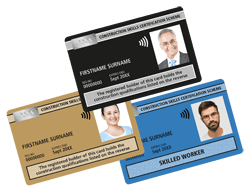
What qualifications do I need to get a CSCS Card?
Once again, the Card Finder is your friend in this regard – just put in your trade and it will generate a response of which card you need and the qualification you must hold to get it.
What if I don’t have a qualification but need a CSCS Card?
Examples Of Temporary CSCS Cards
Within the range of CSCS cards are both Temporary and Provisional Cards.
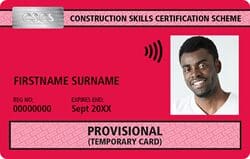
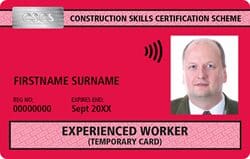
For example, you can get a card if you are an Experienced Worker but have never held formal qualifications – many people call this “Time Served”.
To get the Red “Experienced Worker” card, you must have a year or more in your trade, be registered for a qualification and will need to send a copy of your registration to the CSCS to get issued with your card.
Provisional CSCS cards are issued to people who are working temporarily – for example someone who is being considered for a full time job, or as a potential Apprentice and who is on work experience.
Temporary cards cannot be renewed – the CSCS have become wise to their potential misuse.
However, they provide a means for people to enter the trades or start work on a “Fully Carded” site – or for an employer to migrate the workforce to fully qualified status.
There is also a CSCS “Trainee” card and one for people undertaking Apprenticeships. Both these are Red and gain access to work on carded sites. Apprenticeship cards are free.
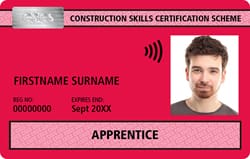
Can I claim “Grandfather Rights”?
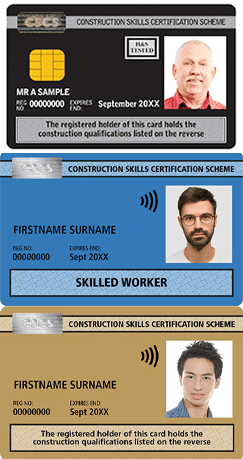
To avoid wholesale disruption of the industry, when the CSCS scheme was first introduced, Industry Accreditation, also known as Grandfather Rights, was created so that existing “time served” workers could obtain CSCS cards on the strength of their employers’ recommendation rather than having a recognised qualification.
Whilst people already holding a card are currently able to renew it on the same basis, the Industry Accreditation classification and associated card was closed to new applications in 2010.
There are still about 60,000 people holding these cards, but from January 2020, all cards issued will expire in December 2024 and the card will not be issued for renewal from June 2024.
So if you have “Grandfather Rights” you are OK until the end of 2024, but if you have never applied for them, or have let your card lapse, you will not be able to use this classification to get a card.
How do I get the qualifications I need for a CSCS Card?
Remember the good news – the money you spend on qualifications to get your CSCS Card can be claimed back in your tax return for the year.
This applies even if you are employed, rather than self-employed.
SuperSkills receives many enquiries from people who want to get qualified in order to move on from their present position, or whose employer does not offer training to staff.
We have a comprehensive range of NVQ Assessments at Level 2 and Level 3 (Blue & Gold CSCS Cards) as well as online training to get the Site Labourer card and many Health & Safety related training courses.
Please also bear in mind, that if you (or the company your work for) are registered for VAT, that element of our invoice is fully recoverable.
Many calls we receive start with one of two misconceptions…. “I need my City & Guilds” or “I want my Level 3” so let’s start with those.
“City & Guilds” isn’t a qualification, or a qualification standard. It is an Awarding Organisation, regulated by the Qualifications and Curriculum Authority (QCA).
Historically, they were associated with trade skills and in particular, construction qualifications.
That’s why so many people will have (back in the day) been through apprenticeships or other courses under their brand name.
The Construction Industry Training Board (CITB) developed their own awarding body Construction Skills, delivering similar qualifications and during the 2000’s joined the City & Guilds in the Construction Awards Alliance.
Subsequently they parted and CSkills Awards was created, an awarding body owned and operated by the CITB. CSkills quickly became the leading awarding body for the construction sector.
Unsurprisingly, having the sector skills council, the awarding body and the card scheme operator under the same roof drew suggestions of a conflict of interest, so the CITB was forced to sell off CSkills Awards, leading to its purchase by the NOCN Group in 2017.
SuperSkills has been around long enough to have worked with the various awarding bodies throughout this time. Whilst we’re looking forward to a period of stability, we are very happy to be delivering NOCN_CSkills Awards qualifications in the knowledge they present the best opportunity for construction workers to get qualified quickly, simply and conveniently.

What are NVQ’s?
The letters “NVQ” stand for National Vocational Qualification. In Scotland, Scottish Vocational Qualifications, or SVQ’s. They are equivalent and interchangeable.
Unlike qualifications you get at school or on a training course, vocational qualifications are based on what you can do. NVQ’s need your work to be assessed and set against national standards.
NVQ’s are regulated by the Qualification & Curriculum Authority (QCA). To award the NVQ, the awarding body must get approval for how the programme of learning and assessment is designed from the QCA.
NVQ’s start life with a Sector Skills Council, such as the CITB. Employers work with the Sector Skills Council and set standards for every trade at a particular level.
Why are NVQ’s at different levels?
A Site Carpenter at Level 2 will be required to have a set of skills and competencies, both personal and job related. At Level 3, these will be for more complicated work and supervisory duties.
For example – Level 2 Site Carpenters are assessed “Installing first fixing components in the workplace”, whereas Level 3 assessment involves “Installing bespoke first fixing components in the workplace”.
The supervisory nature of the role is demonstrated – Level 2 “Conforming to productive working practices in the workplace” and at Level 3 “Confirming the occupational method of work in the workplace”.
As a basic rule of thumb, Level 2 qualifications sit with GCSE’s and Level 3 are more equivalent to “A” Levels.
Level 2 qualifications will get you a Blue “Skilled Worker” Card and Level 3 a Gold “Advanced Craft” or “Supervisor” CSCS Card.
“I want my Level 3” – Our first question when a customer asks how to get a Gold CSCS Card is to ask why.
Often, we learn the potential candidate is (quite rightly) demonstrating his or her pride in trade skills gained over decades and wants them to be recognised. They are “Advanced Craft” workers.
But usually all they need is a Blue “Skilled Worker” CSCS card to get on or stay on site. That’s why our advice – always given freely and impartially – is “Level 2 will do”.
Yes it’s great to have a Gold Level 3 card, but the Level 3 qualification is much bigger and more expensive than the Level 2.
Level 2 starts at £775 for a Site Work Assessment and nearly every potential Level 3 candidate will be eligible for that “Fast Track” route to qualification. Level 3 will usually be £1150.
So, we will always find out your reasons for wanting the Level 3 qualification. Otherwise you’re doing the equivalent of putting expensive alloy wheels on your works van. Nice to look at but won’t pay you back.
Your qualification from CSkills Awards gained through SuperSkills will be delivered by On Site Assessment & Training.
I have a Diploma from XXX College or YYY Training Provider, but the CSCS won’t give me a card – why not?
This is a question we get asked too frequently. It is particularly annoying to us because the potential customer on the phone is deeply unimpressed.
They have often spent a lot of time and money getting a Level 2 or 3 Diploma and only now discover it is not the NVQ they originally needed – or indeed asked for. We’ve written about this before.
Public Sector Further Education Colleges are particular offenders in this – and they should know better.
Even if the Administrators in their booking office don’t put somebody on the right course, the Assessors, who after all, have to be tradespeople, should recognise that Harry in his fifties, who’s been painting and decorating since he left school, doesn’t need to do a year or two of evening classes.
Similarly, you can’t go on a six or eight week course and get an NVQ at a training provider. You must be assessed in the workplace.
Whilst many people get their skills doing this, they find afterwards the NVQ assessment element is not available in their area.
Level 2 NVQ’s can be either Certificate or Diploma qualifications and the different names do not necessarily mean anything significant. Generally, a Certificate-level qualification will involve less work by the candidate than a Diploma.
Look for accredited qualifications. CSCS will only accept qualifications that are accredited by a recognised awarding body. These awarding bodies are regulated by Ofqual in England, Wales and Northern Ireland, and SQA in Scotland.
Check the expiry date. CSCS cards typically last for five years, so make sure any qualification you’re considering isn’t nearing its expiry date.
How much will it cost to get a CSCS card?
The overall cost of getting a CSCS card will depend on a few factors:
- Whether you need a qualification or already have one
- The type of card you want- the Level 1 qualification for a Site Labourer card is the cheapest, with Level 2 for a Blue Card and Level 3 for a Gold Card being more expensive
- As a rough guide, you can expect to pay somewhere between £150 and £1200 to get a CSCS card up to Level 3.
- The cost of taking the CSCS Health, Safety & Environment test.
Is there any financial help available?
There may be financial help available to cover the costs of getting a CSCS card, such as:
- Grants from the Construction Industry Training Board – businesses registered with the CITB are eligible for Grants when NVQ’s are achieved by their workers. See the details here.
- Government Agency Grants – for example if you are unemployed and in receipt of benefits. You will have a Work Coach who can advise you about getting financial help.
- Help from your employer – especially if they are eligible for VAT relief or CITB Grant – although SuperSkills has an Easy Payment Scheme, you may find getting the fee deducted from your pay more suitable if your employer can’t pay on your behalf.
- Reimbursement through tax relief – submit our invoice with your self-assessment return.
It’s always worth checking to see if you’re eligible for any financial assistance before you start paying out for qualifications and tests.
A Few More Tips About CSCS Cards
- Keep your CSCS card up to date – CSCS cards typically last for five years, so you’ll need to renew it before it expires.
- At that point you will need to resit your CITB Health, Safety & Environment test
- You will not need to retake your qualification to renew your CSCS Card
- Take a scan of your qualification Certificates – we get calls every day from people who’ve lost them
- Report a lost or stolen card – If you lose your CSCS card, you’ll need to report it to CSCS as soon as possible.
Conclusion
A CSCS card is as necessary as a set of tools for anyone who wants to work in the construction industry. It demonstrates that you have the necessary skills and knowledge to work safely on site.
The process of getting a CSCS card can be a bit complex, but hopefully, this guide has helped to explain the steps involved.
You Can Get The NVQ You Need For Your CSCS Card At SuperSkills
- CSCS Labourer Card Courses
- Bricklaying NVQ Courses at Level 2 and Level 3
- Building Maintenance Courses at Level 2
- Carpentry & Joinery NVQ Courses at Level 2 and Level 3
- Door, Gate & Shutter NVQ Courses at Level 2
- Dry Lining & Interior Systems NVQ Courses at Level 2
- External Rendering NVQ Courses at Level 2
- General Construction Operations NVQ Courses at Level 2
- Multi-Trade NVQ Courses at Level 2
- Occupational Work Supervision Courses at NVQ Level 3
- Painting & Decorating NVQ Courses at Level 2 and Level 3
- Plastering NVQ Courses at Level 2 and Level 3
- Roofing NVQ Courses at Level 2
- Wall & Floor Tiling NVQ Courses at Level 2 and Level 3